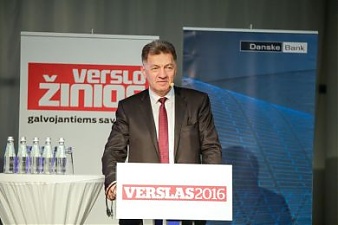Analytics, Economics, Energy, Legislation, Lithuania, Markets and Companies
International Internet Magazine. Baltic States news & analytics
Thursday, 29.01.2026, 05:29
Lithuanian PM introduces economic priorities for 2016
 Print version
Print version |
|---|
| Photo: lrv.lt |
Butkevicius emphasised that the energy sector was key for guaranteeing Lithuania's economic and social security and stability. The prime minister noted the completion of the Liquefied Natural Gas (LNG) terminal project, the construction of gas connection with the regional gas pipeline and the construction of electricity links with Poland and Sweden.
Next, the prime minister said that electricity price was reduced by around 13% in two years, while heating price was reduced by nearly 20%. Next year the second stage of heating sector reform will commence – biofuel cogeneration power plants will be built in Vilnius and Kaunas, which will be the largest energy facilities to be built in the last 20 years. Once they are operational, heating prices for consumers will decrease furhter.
The head of Government noted that fiscal policy instruments have been included in the 2016 draft budget and will promote economic growth. Apart from European funds the state will allocate EUR 1.23 billion for this.
According to the prime minister, measures are foreseen to boost economic viability counterbalancing export decrease or temporary weakening of the economy. The domestic market and internal demand will be strengthened, however, this will not contradict sustainable growth and expenditure restraint applied in the euro area.
In order to reduce tax burden on the lowest earners and create progressive taxation, the maximum monthly tax-exempt income amount will be increased in 2016 by EUR 34, from EUR 166 to EUR 200. Whereas the fixed additional tax-exempt income amount per every child in a family will be doubled from EUR 60 to EUR 120. Other measures include larger minimum monthly wage in accordance to economic realities and wage growth in certain sectors.
According to Butkevicius, all three measures have synergic influence – they improve purchasing power which in turn promotes business development.
The prime minister said that the minimum monthly wage would grow from EUR 325 to EUR 350 from the beginning of 2016. Meanwhile, salaries of employees in the arts sector will increase by EUR 71 on average – EUR 12 million will be allocated for this. Another EUR 12 million will be spent to improve remuneration for soldiers.








 «The Baltic Course» Is Sold and Stays in Business!
«The Baltic Course» Is Sold and Stays in Business!

